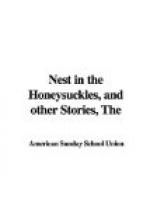Our Saviour, when dying on the cross, taught us practically the duty of forgiveness. He prayed even for those who put him to death. “Father, forgive them, for they know not what they do.” Do you not suppose he was pleased to hear Eddie ask his Father in heaven to forgive Mr. Morrison and make him a good man?
[Illustration]
THE BOY WHO KEPT HIS PURPOSE.
“I would not be so mean,” said George Ward to a boy who stood by, while he put the candy he had just bought in his pocket.
[Illustration: “I wouldn’t be so mean.”]
“You have no right to call me mean,” replied Reuben Porter, “because I don’t spend my money for candy.”
“You never spend it for any thing,” continued George, tauntingly.
It was true. Reuben did not spend his money. Do you suppose it was because he loved it more than other boys do?
Reuben turned slowly away, meditating upon what had occurred.
“I will not care for what George thinks,” he at length said to himself; “I have four dollars now, and when I have sold my cabbages, I shall have another dollar. I shall soon have enough,” and his heart bounded joyfully, his step recovered its elasticity and his pace quickened, as the pleasant thought removed the sting which the accusation of meanness had inflicted on his sensitive spirit.
Enough did not mean the same with Reuben as it means with grown people. It had a limit. He hastened cheerfully home, or to the place he called home. He had no father or mother there, but kind and loving friends in their stead. His father had died two years before, leaving a wife and four children without property to sustain them. Reuben was the eldest, and as he was old enough to assist in the labours of a farm, it was thought best he should leave his mother. Mr. Johnson, a neighbour took him into his family, where he soon became a great favourite.
There was one thing about the child, however, which good Mrs. Johnson regarded as a great fault. It was what she called “a spirit of hoarding.” She said she never gave him an orange, or an apple, that he did not carry it to his room, instead of eating it. Perhaps his sisters at home, or dear little brother Benny, could tell what became of them.
Mrs. Johnson had noticed, too, in his drawer, a box, which was quite heavy with money. She did not believe he had bought so much as a fish-hook, since he had been in their family. If he should go on in this way he will grow up to be a miser. Mr. Johnson smiled at his wife’s earnestness, and remarked that with such an example of generosity as Reuben had constantly before him, he could not believe the child was in much danger from the fault she feared. “It must be remembered,” he said, “that Reuben has his own way to make in life. He must early learn to save, or he will always be poor. There are his mother and sisters, too, who need his aid.”




